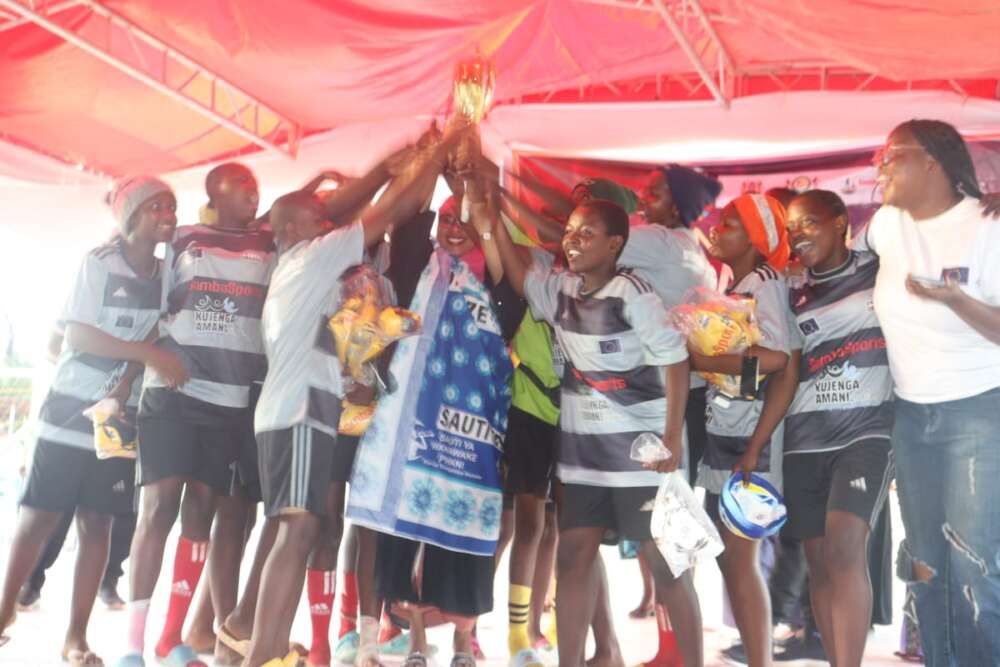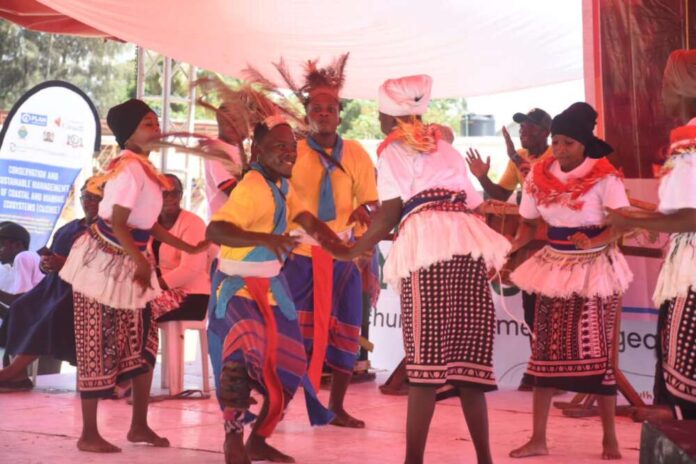By Teryani Mwadzaya, DevReporter, Kwale County
Summary
- 600 women-led companies have been formed for the purposes of increasing employment opportunities for Kwale Women
- Stakeholders come together to combat increasing cases of teenage pregnancies.
- There is need for greater community involvement and resource mobilization.
Despite rising cases of teenage pregnancy, women in Kwale County embrace business growth by creating 600 women-led companies that operate in groups.
Speaking during the International Women‘s Day (IWD) 2024 celebrations, Kavumbi Mwashanga, a mother of 5, expressed joy for joining the celebrations, given that she had now become an entrepreneur despite the challenges at home.
“I am so happy that we formed a women’s group turned into a company and we applied for a tender for the construction of a perimeter wall in Kwale County. This was not easy as my husband did not want me to be part of the company as he feared that I would spend less time at home,” said Kavumbi.
Moreover, Mwanatumu Ndaro, a mother of 5 said that by being part of the company and having been trained on financial literacy, she could now run her business more efficiently.
“I am so happy that I opened my kiosk in Kwale town, where I sell tomatoes and vegetables. Through the newly formed company, we have been trained on how to keep financial records and I am happy that I can now keep records of my business”, Said Mwanatumu Ndaro.
According to the Manager of Samba Youth Sports Agenda, Mwanaisha Kuwania, the plight of teenage pregnancies, stood as a critical issue that shadows the aspirations of many young girls in the region.
“600 women groups have opened companies and continue to get support to secure government tenders. This is a good step towards ensuring that our women acquire necessary business skills,” said Mwanaisha Kuwania.
“Women encounter a lot of problems at home. For example, when trauma is not healed, it is transferred. For many young girls, teenage pregnancy is a menace that negatively impacts their future aspirations. Such training will empower their mothers economically through increased income, leading to reduced cases of teenage pregnancy,” Mwanaisha Kuwania further stated.
A group of widows who showcased their culinary skills by prepared a delightful array of coastal cuisine that left mouths watering and stomachs satisfied during the celebrations, insisted that it was important for women to have sources of income to better provide for their families.
“As widows, we need to be empowered financially to help improve the living conditions for our families so that our young daughters are not forced to have several sexual partners for survival,” said Mwanaisha Gaserego, Chairlady Tuwajali Wajane Kwale Initiative.
Moreover, Asma Hadi Awadh, Manager, Coastal Kenya Programme, advised stakeholders at the grassroots to form meaningful partnership and collaborate with the government, and thereby enhance women’s empowerment.
“Women should come out and seek empowerment opportunities so that they can uplift their families as well as their own lives. Grassroots initiatives are rising to favour women in all sectors. Women should seek out Kwale Governor, Fatuma Achani, who has enterprising projects to uplift women in Kwale County,” said Asma Hadi Awadh.

As the country aligns with IWD’s 2024 theme, “Invest in Women, Accelerate Progress,” coupled with the Sustainable Development Goals (SDGs) goal for ending discrimination against women and girls, the Kwale celebrations recognized that empowering women and girls is crucial for spurring economic growth and development. Governor Fatuma Achani committed to continue fighting against injustice towards the women of Kwale County.
“We are here to fight against all the injustices women face. I could not be more grateful to all organisations that have joined us,” remarked Governor Fatuma Achani.
The constitution of Kenya under the Bill of Rights at Article 27 on equality and freedom from discrimination states that the State is mandated to ensure the realisation of the rights guaranteed under this Article. These include taking legislative and other measures, such as developing requisite policies, e.g., on Affirmative Action and others, for the purposes of redressing the disadvantages arising discrimination as experienced by individuals or groups. To this end, the government allocated funds to facilitate women’s participation in entrepreneurial activities towards financial independence. Through the elected Woman Representative in each county, the programme aims to reach the marginalised and minority communities.
At Chapter Eleven of Kenya’s 2010 constitution, the principles of Devolution seek to promote social and economic development. The provision of proximate under this function, i.e., bringing government services closer to the people across Kenya has enabled the transfer of financial and administrative autonomy to 47 county governments. Thus, 11 years since 2013 when the reforms were initiated, there have been concerted efforts to address the needs of minorities including women.
Additionally Kenya joined 180 countries committed to promoting gender equality through the adoption of the 1995 Beijing Declaration on Gender Equality. Since then, Kenya has adopted a raft of critical legislations designed to address sexual and gender-based violence (SGBV). And through the Generation Equality Forum that took place in June 2021, Kenya pledged to end Gender-Based Violence by 2026.






